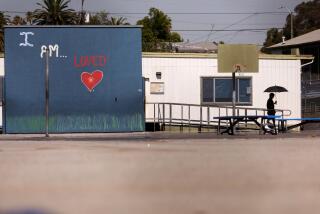Classroom Project Adds Budget Woes
ARCADIA — At a time when Arcadia schools are already feeling the crunch of a tight budget, the school district is having to spend $250,000 to replace two classrooms and renovate other facilities that were built without state approval.
Structures at nine schools were built more than 15 years ago without a green light from the state architect’s office, which must approve all public school buildings that house students. For some unknown reason, school officials say, the district at the time failed to consult the state.
“We’re not sure why they didn’t get approval,” said Dennis Chuning, assistant superintendent in charge of business services for the district. “Maybe they were in a rush to build and decided against it.”
State Aid Affected
Chuning emphasized that the classrooms and other additions are safe and that the district is in violation of a technicality only. But when a school district fails to obtain state approval for buildings that house students, it must remedy the situation or be precluded from applying to the state for special funding. So the district decided on its own to spend $250,000 now for a chance at possibly winning $4 million in future construction grants.
Patrick Campbell, chief structural engineer for the office of the state architect, said state oversight is needed to assure earthquake safety and other standards. Campbell said it is virtually impossible to determine the safety of a completed building because its foundation and other structures are no longer visible.
“It’s not just a technicality,” Campbell said. “It’s against the law. It’s against the education code.”
School officials discovered the building compliance problem in March, just as they were trying to cope with news that school revenues from the state, which had risen 5.5% in 1986, would increase only 2.5% in 1987--an actual cut when accounting for inflation.
$24.2-Million Budget
The district has proposed a 1987-88 budget of $24.2 million, virtually the same as last year. This translates into more than a $1-million deficit if the district is to maintain its current level of services while spending more for inflation and salary increases built into teachers’ contracts.
Chuning said no teachers will lose their jobs this year, but he did not rule out layoffs of non-teaching employees or future layoffs of teachers. In addition, he said, several teaching positions vacant through attrition will probably remain unfilled.
“We’re deciding right now exactly where the cuts will be made,” Chuning said. “We’ll make recommendations to the district board sometime in August.”
Chuning said the $250,000 to replace two classrooms and renovate or tear down other additions will be covered by the recent $1-million sale of a piece of district property. But he said the district would have preferred using all the proceeds from the sale to help with the deficit.
Bad Timing
“The news of having to renovate could have come at a better time,” he said. “It’s straining what little capital construction money we have left.”
The district will need to buy two portable classrooms, at a cost of $60,000 each, to replace two classrooms built without state approval at Hugo Reid Elementary School, Chuning said. One of the classrooms will be torn down and the other will be used for administrative purposes.
In addition, it will cost $70,000 to remove and relocate a photography lab at Arcadia High School and $12,000 to remove and relocate the library at Highland Oaks Elementary. At other schools, the problem will be remedied at little or no expense by moving students from buildings lacking state approval to approved buildings.
The bulk of the work should be completed by the start of the 1987-88 school year with the remainder of the improvements finished by the spring semester, Chuning said.
Susan Ridgeway, a teacher at Foothill Junior High and president of the Arcadia Teachers Assn., praised the district for its quick response. She denied rumors that teachers and students were concerned about the safety of the structures.
“I haven’t heard anybody express concern that the buildings might be unsafe,” she said. “It just hasn’t been an issue.”
More to Read
Sign up for Essential California
The most important California stories and recommendations in your inbox every morning.
You may occasionally receive promotional content from the Los Angeles Times.










